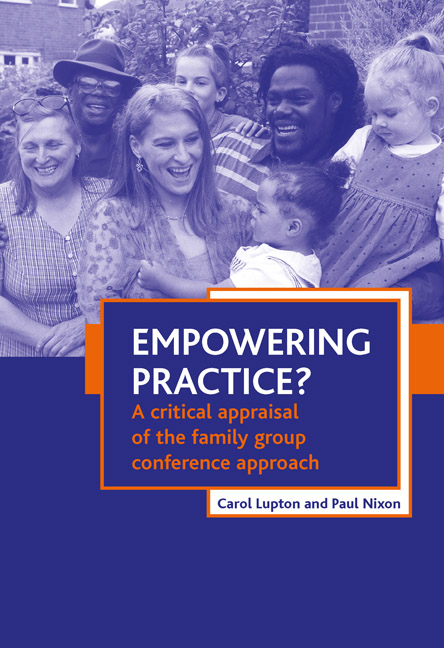Book contents
- Frontmatter
- Contents
- Preface
- Acknowledgements
- Introduction
- one The dilemmas of empowerment
- two Partnership and empowerment in children’s services
- three Lessons from New Zealand
- four Empowering professionals?
- five International perspectives
- six Empowerment in process?
- seven Assessing outcomes in child welfare
- eight Empowering outcomes?
- nine Conclusion
- Bibliography
- Index
Introduction
Published online by Cambridge University Press: 05 July 2022
- Frontmatter
- Contents
- Preface
- Acknowledgements
- Introduction
- one The dilemmas of empowerment
- two Partnership and empowerment in children’s services
- three Lessons from New Zealand
- four Empowering professionals?
- five International perspectives
- six Empowerment in process?
- seven Assessing outcomes in child welfare
- eight Empowering outcomes?
- nine Conclusion
- Bibliography
- Index
Summary
Given our power to legitimate, we need to be more critical and less casual about what we advocate as empowering. (Rappaport, 1995, p 107)
The last two decades have seen increased political, legal and moral debate about the rights and needs of children worldwide. While the issues are complex, and absolute agreement remains elusive, a consensus may have begun to emerge in the shape of the United Nations (UN) Convention on the Rights of the Child. Representing the first detailed international treaty providing minimum standards for children, by 1995 the Convention had been ratified by 175 countries. Article 12 of the Convention affirms the principle that children should have a greater say over matters affecting them and their lives. The Convention also stresses the importance of families, extended families and communities in children's lives (Article 5) and parents’ duty to exercise their influence and powers over children responsibly and in the child's best interests. Precisely how these standards are best achieved remains contentious, however.
Balancing the different, and sometimes conflicting, rights and responsibilities of children, their families and the State has been an enduring problem for childcare policy and practice and was a central concern of the 1989 Children Act (England and Wales). The ambition of the Act was that these respective rights and responsibilities would be balanced by a more inclusive and collaborative approach to families, although still ultimately secured though social work agency procedures and the courts. While the Act anticipated that its philosophy of inclusion would be implemented through working in partnership with families and their communities, in practice this partnership has been hard to achieve. The growing interest in family group conferences (FGCs) as a model for partnership may reflect a continued frustration at the inability to work collaboratively and to manage in practice the tension between the role of the family and that of the State in the care of children.
This book is about the FGC approach to decision making in child welfare. Developed originally in New Zealand in work with Maori and Pacific Islanders, the approach attempts to build on family and community strengths in planning for the care and protection of children.
- Type
- Chapter
- Information
- Empowering Practice?A Critical Appraisal of the Family Group Conference Approach, pp. 1 - 6Publisher: Bristol University PressPrint publication year: 1999



